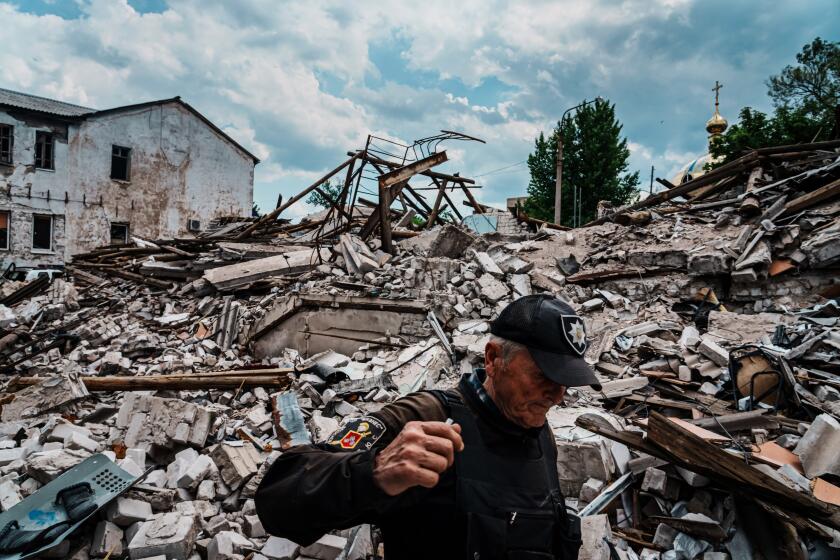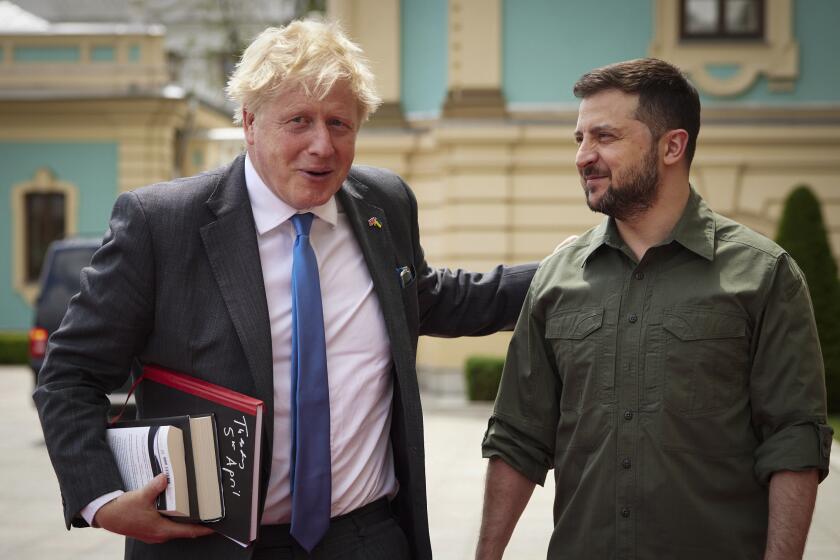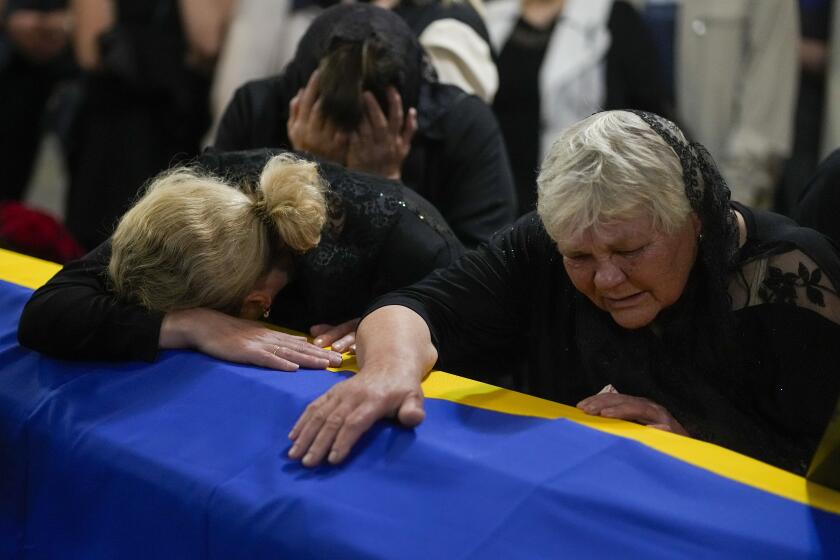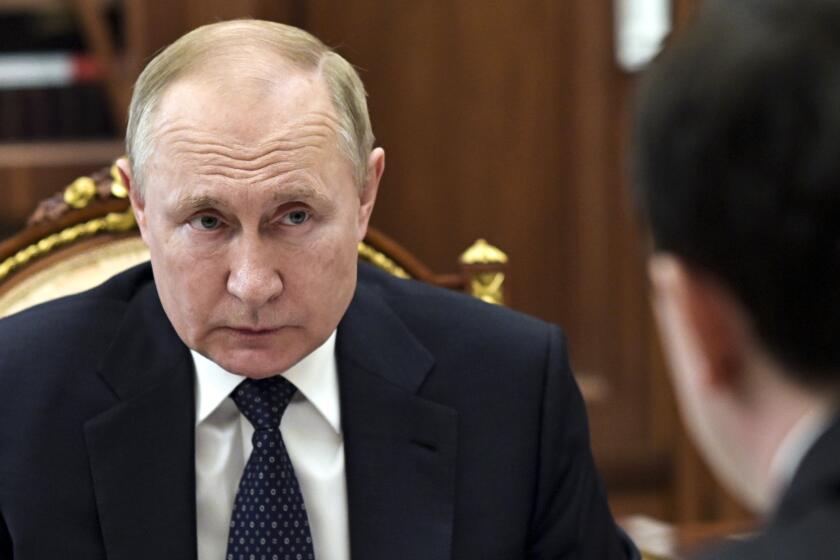‘Everything is on fire’: Eastern Ukraine weathers bombardment
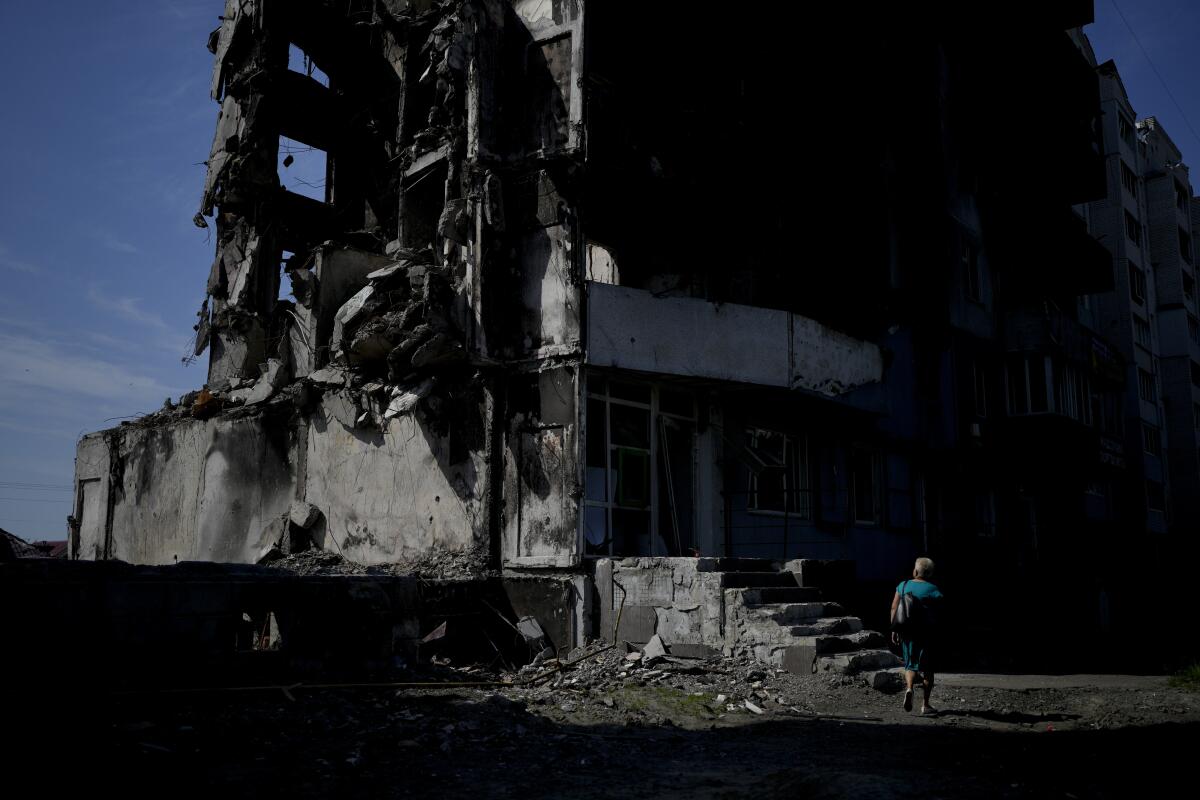
- Share via
KYIV, Ukraine — Russian attacks laid down a curtain of fire Tuesday across areas of eastern Ukraine where pockets of resistance are denying Moscow full military control of the region, almost four months after the Kremlin unleashed its invasion.
“Today everything that can burn is on fire,” Serhiy Haidai, the governor of Ukraine’s eastern Luhansk region, told the Associated Press.
Russia’s war has caused alarm over food supplies from Ukraine to the rest of the world and gas supplies from Russia, as well as raising questions about security in Western Europe.
The Russian military currently controls about 95% of the Luhansk region. But Moscow has struggled for weeks to overrun it completely, despite deploying additional troops and possessing a massive advantage in military assets.
“With the help of tactical movements, the Ukrainian army is strengthening defenses in the Luhansk region,” Ukrainian President Volodymyr Zelensky said in his nightly video address. “That really is where the toughest situation is now.”
In the city of Severodonetsk, the hot spot of the fighting, Ukrainian defenders held on to the Azot chemical plant in the industrial outskirts. About 500 civilians are sheltering at the plant, and Haidai said the Russian forces are turning the area “into ruins.”
“It is a sheer catastrophe,” Haidai told the AP in written comments about the plant. “Our positions are being fired at from howitzers, multiple rocket launchers, large-caliber artillery, missile strikes.”
Ukraine is in a brutal artillery war, the kind not seen since World War I. Lacking better weapons, it is losing as many as 6,000 soldiers a month.
The defense of the chemical plant recalled the besieged Azovstal steel mill in the brutalized city of Mariupol, where Ukrainian troops were pinned down for weeks.
Neighboring Lysychansk, the only city in the Luhansk region that is still fully under Ukrainian control, also was targeted by multiple airstrikes.
The airstrikes on Severodonetsk and Lysychansk ruined more than 10 residential buildings and a police station. In the city of Avdiivka in the Donetsk region, a school burned down as the result of the shelling, the president’s office said. The Luhansk and Donetsk regions make up the Donbas.
Separately, U.S. Atty. Gen. Merrick Garland met for about an hour at a Ukrainian-Polish border post with Ukrainian Prosecutor General Iryna Venediktova. They discussed how the U.S. can help identify, apprehend and prosecute anyone involved in war crimes and other atrocities in Ukraine.
“We and our partners will pursue every avenue available to make sure that those who are responsible for these atrocities are held accountable,” Garland said in a statement.
The executive arm of the European Union recommended Friday that Ukraine be granted candidate status to one day join the 27-nation bloc.
Garland also tapped Eli Rosenbaum — a 36-year Justice Department veteran who headed efforts to identify and deport Nazi war criminals — as counselor for war crimes accountability. He will coordinate efforts to hold accountable those responsible for war crimes and other atrocities in Ukraine.
Kharkiv, Ukraine’s second-largest city, also came under heavy Russian shelling on Tuesday. Gov. Oleh Syniehubov said 15 civilians were killed and 16 wounded in Kharkiv and elsewhere in the region.
Zelenskyy said the attacks in the Kharkiv region were especially “cruel and cynical” because they brought no clear benefit to the Russian forces. “The Russian army is deaf to any rationality. It simply destroys, simply kills, and in this way it shows its command that it is not really standing in place,” he said in his video address.
Speaking Tuesday to graduates of Russian military academies at a lavish Kremlin reception, Russian President Vladimir Putin hailed the Russian armed forces as heirs to the country’s “legendary” military traditions. “The country is now going through another series of trials,” he said, expressing confidence that Russia will overcome all the challenges.
“There is no doubt that we will become even stronger,” he added.
The Kremlin has largely kept mum about its plans for the Ukrainian cities, towns and villages it has captured, but long-term occupation looks likely.
International support for Ukraine was demonstrated once more when a Nobel Peace Prize medal auctioned off by Russian journalist Dmitry Muratov sold Monday night for $103.5 million, shattering the old record for a Nobel. The auction aimed to raise money for Ukrainian child refugees.
Geopolitical tensions stemming from Russia’s invasion returned to Lithuania. Due to European Union sanctions on Moscow, the Baltic country earlier this month banned rail traffic from crossing its territory from Russia to the Russian exclave of Kaliningrad.
Will inflation and energy woes crack Western unity over Ukraine? Putin likely hopes so.
Kaliningrad, with a population of around 430,000 people, is wedged between Lithuania and Poland, both EU countries, and is isolated from the rest of Russia.
Nikolai Patrushev, the powerful secretary of the Kremlin’s Security Council and a hard-liner, visited Kaliningrad on Tuesday and vowed to respond to the ban.
“The relevant measures are being drawn up in an interagency format and will be adopted shortly,” Patrushev said, without elaborating. He added: “Their consequences will have a significant negative impact on the population of Lithuania.”
More to Read
Sign up for Essential California
The most important California stories and recommendations in your inbox every morning.
You may occasionally receive promotional content from the Los Angeles Times.
